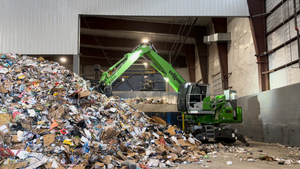Plastics Assn's tout energy recovery as a solution to prevent marine litter
At the 24th Global Meeting on Plastics and Sustainability, some of the world's biggest plastics associations announced continued progress since the launch of the Global Declaration of the Plastics Associations for Solutions on Marine Litter in March 2011, which at that time identified 100 projects.
November 21, 2013
At the 24th Global Meeting on Plastics and Sustainability, some of the world's biggest plastics associations announced continued progress since the launch of the Global Declaration of the Plastics Associations for Solutions on Marine Litter in March 2011, which at that time identified 100 projects. There are now more than 140 industry projects tackling marine litter.
At the three-day meeting, participants also discussed strategies to address sustainability and called on other plastics producers, as well as brand owners, retailers and institutions, to consider undertaking similar efforts. Plastics associations from Malaysia, Brazil, Canada, China, Europe, India, Japan, South Africa and the U.S. analyzed current projects to prevent littering, with a specific emphasis on plastic. As a result they called for improvements in plastic resource recovery and waste management, since 80% of marine litter originates from land.
"Improving plastic recovery so that all plastics are collected and used as a valuable resource for recycling and energy production is the most important step to prevent marine litter in the future," said Steve Russell, VP of plastics for the American Chemistry Council (ACC). Russell called on governments around the world to integrate the issue of littering into their national waste management strategies and to increase public awareness about marine litter and its impact on marine ecosystems. "Every piece of litter has its owner," he said.
The plastics industry also made clear that more involvement of leaders from other business sectors is necessary.
"We believe that strategic partnerships with intergovernmental organizations, NGOs and marine researchers offer a good opportunity for real progress, particularly on resource recovery," he said. "Our industry has proven that it is determined to actively contribute to prevent marine litter. Therefore we now need the involvement of others to take our actions to the next level."
Emerging technologies such as energy recovery and integrated recycling programs are possible solutions to prevent marine litter in particular in regions without integrated waste management infrastructure, in coastal areas with large populations, and on small islands nations, he said.
This requires working together with all interested organizations in partnerships," Russell said.
Recently the ACC and the Los Angeles Chamber of Commerce hosted a panel discussion that highlighted the economic and environmental benefits of recovering energy from non-recycled materials, and how state and local lawmakers can encourage new investment in these emerging technologies. Greg Wilkinson, principal at Earnscliffe Strategy Group, moderated a panel of California business leaders and industry experts that included Caroll Mortensen, director of CalRecycle, Enrique Zaldivar, director of the City of Los Angeles Bureau of Sanitation, and Chuck White of Waste Management.
"We are starting to see the potential benefits to recovering energy from non-recycled materials in California, including landfill diversion and alternative energy production," Wilkinson said.
The panel discussion also included remarks from Mohsen Nazemi, deputy executive officer at the South Coast Air Quality Management District, and Josh Proudfoot, co-founder and principal at Good Company.
"Our industry views energy recovery, especially the latest conversion technologies, as a perfect complement to the efforts in California to increase waste diversion and encourage recycling," said Tim Shestek, ACC's senior director of state affairs.
About the Author(s)
You May Also Like


